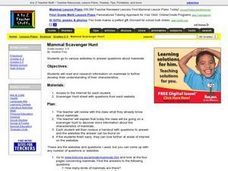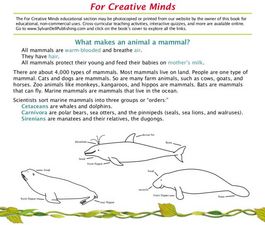Curated OER
Mammals
In this mammals worksheet, students click on the links in the questions about mammals to find the answers to the questions and then come back and answer the questions. Students answer 8 questions total.
Curated OER
Matching Science Words and Definitions About Animals
In this matching science words and definitions about animals learning exercise, learners match fifteen science words about animals with the definitions.
Curated OER
Animals Vocabulary List and Definitions
In this animal words worksheet, students match 15 words pertaining to animals to their definitions in another column. These definitions are related to the general animal kingdom.
Curated OER
Comparing and Contrasting a Desert Reptile and a Rainforest Mammal
First graders compare and contrast two different type of animals while also making predictions, observations, and asking provocative questioning. In this compare and contrast activity, 1st graders acquire knowledge about why some animals...
Curated OER
Pleistocene Mammals
Students research the causes of the extinction of Pleistocene mammals. In this Pleistocene mammals lesson, students read essays to understand the Pleistocene epoch. Students write an essay about the personal impact of this epoch.
Curated OER
Animals Finding Rice Paddies
Fourth graders examine the animals who live in rice paddies and create a chart. For this rice lesson, 4th graders link the types of animals living in each ecosystem with a bar graph. Students use colored bars to show animals that live...
Curated OER
Chalkboard Challenge: Animals
This animal science PowerPoint engages students in a review game about animals. This interactive game is in a "Jeopardy" style format and allows students to review facts about mammals, birds and other animals.
Curated OER
How do animals survive winter?
Students make a chart about hibernation. In this hibernation lesson plan, students discuss hibernation and read about it. Then they fill in a chart about how different animals know when and how to hibernate.
Curated OER
4-h Veterinary Science Activity Page
The 4-H teaches students about agriculture, health, and animal care - the last of which is the focus of this activity. From dogs and cats to pigs and hedgehogs, this worksheet provides helpful tips for caring for animals, as well as...
Curated OER
Mammals: Teeth and Diet
In this mammals' teeth and diet worksheet, students read for information, identify kinds of teeth, and sort animals into categories. In this fill in the blank and T-Chart worksheet, students write multiple answers for two questions.
Curated OER
4-H Veterinary Science Activity Page- Life Skill
In this veterinary science activity page worksheet, learners focus on the life skills associated with ethical decision making. They describe their favorite pet animal, how to care for their pet based on its needs, complete 14 true or...
Curated OER
Animals In Winter
Students read story Animals in Winter, and explore similarities and differences in how humans and other animals prepare for survival in winter. Students create class book that compares and illustrates different ways humans and animals...
Curated OER
Name Match
For this name match worksheet, students match up fourteen different types of mammals with their formal names by drawing a line from one to the other.
Curated OER
A Planet Full of Animals
Students explore a variety of animals that live on our planet. The shapes, sizes, colors, movements, and coverings of the animals are observed. The similarities and differences in the animals are grouped according to common traits.
Curated OER
Mammal Scavenger Hunt
Students use the internet to answer their questions about mammals. They complete a scavenger hunt worksheet to identify their characteristics. They ask any questions they have at the end of the lesson.
Curated OER
Which Animals Are Vertebrates?
In this vertebrate animals worksheet, learners will classify 5 animals as belonging to the bird, mammal, reptile, amphibian, or fish group.
Curated OER
Whale Song Acrostic
What do whales sing about? Invite your class to imagine the thoughts of whales before writing acrostic poems on the topic. The plan blends together a bit of life science with plenty of opportunities for creativity and writing.
Alliance Theater
The Jungle Book Post-Show STEAM Lesson
An ecosystem is really just the flow of energy through many different living organisms. A study of Rudyard Kipling's The Jungle Book leads to an environmental science activity in which learners study how various factors can affect...
Curated OER
Fun with Fictitious Animals
How can one differentiate between a dweezlebub and nessie? Use this fictitious creature dichotomous key to find out! Biologists of all ages will enjoy this creative way to learn about classification, including a chance to draw the...
Sea World
Seals, Sea Lions, and Walruses
Learn about the mammals of the sea with a lesson about seals, sea lions, and walruses. Kids study the characteristics of each pinniped with flash cards and information, and then analyze data about elephant seals, measure heat loss in...
Curated OER
What are Mammals?
Pupils differentiate between wild and tame animals, explain how to classify mammals into groups based on common charactertistics and comprehend the values of zoos. They listen as the teacher reads Psalm 50:10 and explains that all of the...
Curated OER
Mammals Have hair or Fur
First graders complete computer activities, make a mask, separate pictures, and more having to do with mammals. In this mammals lesson plan, 1st graders classify animals as being mammals or non mammals based on their hair or fur.
Curated OER
Mammals Have Fur
First graders study animals. In this animal classification lesson, 1st graders explore the characteristics (primarily fur) that distinguish animals as mammals. They work in groups at various stations that practice this classification...
Curated OER
For Creative Minds: What Makes an Animal a Mammal?
Students read about categories of mammals and their features. Students then construct a marine animal, using given print outs in the lesson. Students then create adaptations for their mammal, using a web site reference for guidance.

























